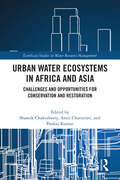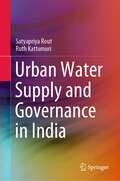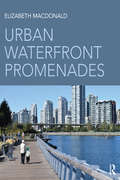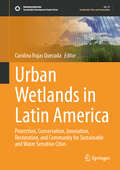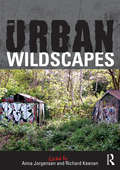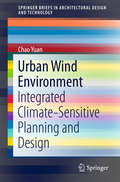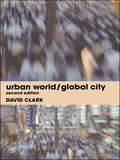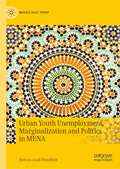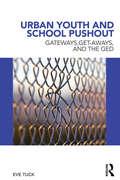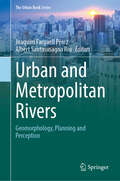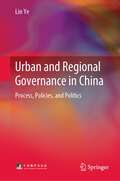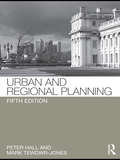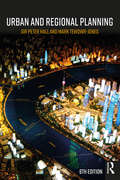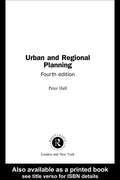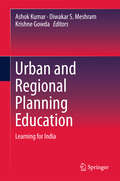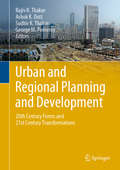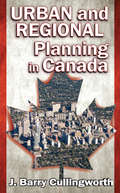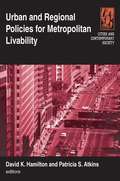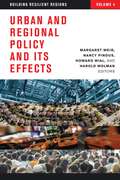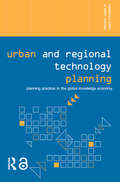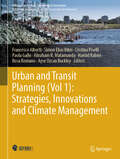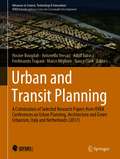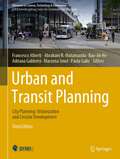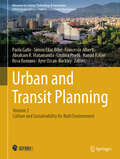- Table View
- List View
Urban Water Ecosystems in Africa and Asia: Challenges and Opportunities for Conservation and Restoration (Earthscan Studies in Water Resource Management)
by Amit Chatterjee Shamik Chakraborty Pankaj KumarThis book examines urban water ecosystem management and restoration through selected case studies in Asia and Africa. Employing a socioecological approach, this volume presents insights on the interlinkages between water, humans, and environmental conservation in an urban context.Topics include human health risks, population displacement and migration, water pollution, water scarcity, flood management, water infrastructure, afforestation, and the effects of climate change. Case studies are drawn from a variety of countries in Africa and Asia, including China, Japan, India, Vietnam, Bangladesh, Kenya, Malawi, and Tunisia, which demonstrate a wide range of different challenges, and opportunities. Overall, this book argues that to better manage urban water resources, there needs to be a shift from urban water management to urban water ecosystem management. This shift needs to acknowledge the complex biophysical and socio-political dimensions of water ecosystems.This book will be of great interest to students and scholars of water resource management, ecosystem services, urban studies, environmental conservation and sustainable development.
Urban Water Supply and Governance in India
by Ruth Kattumuri Satyapriya RoutThis book investigates institutional dimensions of urban water supply in India, with a specific focus on institutional capabilities to provide drinking water to urban households in an efficient, equitable and sustainable manner. This book has been developed through empirical research within the context of growing urbanisation and increasing water needs of Indian cities, and the wider developmental goal of achieving universal and equitable access to safe and affordable water for all – as envisaged in goal 6 of the SDGs.This study revolves around three important aspects of urban water supply and governance. Firstly, it attempts to understand household water service delivery scenarios in urban India, drawing from case studies based on our household survey in four cities – Ahmedabad, Bangalore, Kochi and Hyderabad. Secondly, it examines the question of existing socio-economic inequality and access to water in an urban context in India. While dealing with the issue of inequality and access to water, it attempts to explore the question of whether access to water and water scarcity is socially neutral; whilst also analysing the mechanisms employed by the urban poor to manage their daily water needs. Thirdly, this book explores the role of institutions for efficient and effective delivery of water in urban India. The institutional analysis from a comparative perspective provides important insights to guide current reforms in domestic water supply in India, especially in a neo-liberal context. The book is a valuable resource for academicians, policy makers and practitioners involved in water governance in general and domestic (drinking) water supply in particular. Besides, it is of great interest to those working in the area of urban development, urban planning and household water management. The book is an outcome of a collaborative research project by the authors sponsored jointly by University Grants Commission (UGC), New Delhi and UK-India Education and Research Initiative (UKIERI).
Urban Waterfront Promenades
by Elizabeth MacdonaldSome cities have long-treasured waterfront promenades, many cities have recently built ones, and others have plans to create them as opportunities arise. Beyond connecting people with urban water bodies, waterfront promenades offer many social and ecological benefits. They are places for social gathering, for physical activity, for relief from the stresses of urban life, and where the unique transition from water to land eco-systems can be nurtured and celebrated. The best are inclusive places, welcoming and accessible to diverse users. This book explores urban waterfront promenades worldwide. It presents 38 promenade case studies—as varied as Vancouver’s extensive network that has been built over the last century, the classic promenades in Rio de Janeiro, the promenades in Stockholm’s recently built Hammarby Sjöstad eco-district, and the Ma On Shan promenade in the Hong Kong New Territories—analyzing their physical form, social use, the circumstances under which they were built, the public policies that brought them into being, and the threats from sea level rise and the responses that have been made. Based on wide research, Urban Waterfront Promenades examines the possibilities for these public spaces and offers design and planning approaches useful for professionals, community decision-makers, and scholars. Extensive plans, cross sections, and photographs permit visual comparison.
Urban Wetlands in Latin America: Protection, Conservation, Innovation, Restoration, and Community for Sustainable and Water Sensitive Cities (Sustainable Development Goals Series)
by Carolina Rojas QuezadaThis book is about the contribution of urban wetlands in livable cities. Urban wetlands are very valuable blue-green infrastructure spaces for human settlements, yet they are disappearing as a result of urbanization. This phenomenon is worldwide, but is particularly intense in Latin America. Although international literature has made an effort to document the multiple ecosystem services provided by these ecosystems, such as water and air cleansing, flood mitigation and recreation, among others, we want to draw attention to the fact that the loss of urban wetlands affects the sustainability of cities and future generations. Therefore, and given the weakness of public policies implemented in the region for their protection, it is essential to highlight good practices, mechanisms and strategies aimed at Protection, Conservation, Innovation, Restoration, and work with the Community, all of this hand in hand with the 17 Sustainable Development Goals. The book offers a comprehensive coverage combining the need to protect and conserve urban wetlands from the pressures of urban growth, as well as highlighting successful experiences of regulation and of course applied research aimed at nature-based solution design for flood management and wastewater treatment, restoration areas, green infrastructure plans, as well as experiences of collective work with communities in contexts of political tensions for the defense of wetlands.
Urban Wildscapes
by Anna Jorgensen Richard KeenanUrban Wildscapes is one of the first edited collections of writings about urban ‘wilderness’ landscapes. Evolved, rather than designed or planned, these derelict, abandoned and marginal spaces are frequently overgrown with vegetation and host to a wide range of human activities. They include former industrial sites, landfill, allotments, cemeteries, woods, infrastructural corridors, vacant lots and a whole array of urban wastelands at a variety of different scales. Frequently maligned in the media, these landscapes have recently been re-evaluated and this collection assembles these fresh perspectives in one volume. Combining theory with illustrated examples and case studies, the book demonstrates that urban wildscapes have far greater significance, meaning and utility than is commonly thought, and that an appreciation of their particular qualities can inform a far more sustainable approach to the planning, design and management of the wider urban landscape. The wildscapes under investigation in this book are found in diverse locations throughout the UK, Europe, China and the US. They vary in scale from small sites to entire cities or regions, and from discrete locations to the imaginary wildscapes of children’s literature. Many different themes are addressed including the natural history of wildscapes, their significance as a location for all kinds of playful activity, the wildscape as ‘commons’ and the implications for landscape architectural practice, ranging from planting interventions in wildscapes to the design of the urban public realm on wildscape principles.
Urban Wind Environment: Integrated Climate Sensitive Planning And Design (Springerbriefs In Architectural Design And Technology Ser.)
by Chao YuanIn the context of urbanization and compact urban living, conventional experience-based planning and design often cannot adequately address the serious environmental issues, such as thermal comfort and air quality. The ultimate goal of this book is to facilitate a paradigm shift from the conventional experience-based ways to a more scientific, evidence-based process of decision making in both urban planning and architectural design stage. This book introduces novel yet practical modelling and mapping methods, and provides scientific understandings of the urban typologies and wind environment from the urban to building scale through real examples and case studies. The tools provided in this book aid a systematic implementation of environmental information from urban planning to building design by making wind information more accessible to both urban planners and architects, and significantly increasing the impact of urban climate information on the practical urban planning and design. This book is a useful reference book to architectural postgraduates, design practitioners and planners, urban climate researchers, as well as policy makers for developing future livable and sustainable cities.
Urban World/Global City
by David ClarkThis book identifies and accounts for the characteristics of the contemporary city and of urban society. It analyzes the distribution and growth of settlements and explores the social and behavioral characteristics of urban living. The latest theoretical and empirical developments and insights are synthesized and presented in an accessible and engaging way.This second edition has been extensively updated and referenced. Each chapter includes sets of learning objectives, annotated readings and topics for discussion. Well-illustrated throughout, it will be essential reading for students of geography, sociology and development studies and all who seek an understanding of how the urban world has evolved and how it will change in the twenty-first century.
Urban Youth Unemployment, Marginalization and Politics in MENA (Middle East Today)
by Rawan Asali NuseibehThis book focuses on Arab youth marginalization along intersectional lines of gender, ethnicity and social class in four cities: Jerusalem, Amman, Cairo, and Tunis. The author explores how the political and economic climates in each city influence the life prospects of youth and uncovers their narratives around their aspirations, disappointments and life choices. Providing an interdisciplinary approach, the project will interest a wide range of audiences including graduate students, scholars, and policy makers in the fields of the Middle Eastern studies, political science, urban studies, and education.
Urban Youth and School Pushout: Gateways, Get-aways, and the GED (Critical Youth Studies)
by Eve TuckWinner of the 2013 American Educational Studies Association's Critics Choice Award! Recent efforts to reform urban high schools have been marked by the pursuit of ever-increasing accountability policies, most notably through the use of high-stakes standardized testing, mayoral control, and secondary school exit exams. Urban Youth and School Pushout excavates the unintended consequences of such policies on secondary school completion by focusing specifically on the use and over-use of the GED credential. Building on a tradition of critical theory and political economy of education, author Eve Tuck offers a provocative analysis of how accountability tacitly and explicitly pushes out under-performing students from the system. By drawing on participatory action research, as well as the work of indigenous scholars and theories, this theoretically and empirically rich book illustrates urban public schooling as a dialectic of humiliating ironies and dangerous dignities. Focusing on the experiences of youth who have been pushed out of their schools under the auspices of obtaining a GED, Tuck reveals new insights on how urban youth view accountability schooling, value the GED, and yearn for multiple, meaningful routes to graduation.
Urban and Metropolitan Rivers: Geomorphology, Planning and Perception (The Urban Book Series)
by Joaquim Farguell Pérez Albert Santasusagna RiuThis book provides a detailed description of fluvial processes and their influence on urban sites. During the urban expansion of modern cities throughout the twentieth century, rivers have become a source of problems during high flood events. However, due to growing social pressure, especially in dense cities, rivers are viewed as new leisure areas given that they also provide highly valuable ecosystem services. People seek open and environmentally friendly spaces amidst the dense street networks of cities. Yet, we should not forget that rivers are not merely domesticated elements of nature for leisure purposes only. Flooding risks and damages are possible within urban environments. How should we address the social and ecological interactions? How should we plan for these complexities to meet the growing social requirements and needs while respecting river dynamics? Hydrologists, geomorphologists, engineers, geographers and urban planners could leverage the knowledge and examples provided to enhance the interaction between nature and society in the growing cities of the twenty-first century.
Urban and Regional Governance in China: Process, Policies, and Politics
by Lin YeThis book examines the process, policies, and politics of urban development in China, with particular attention to city region governance, urban redevelopment, and urban–rural interaction through intensive theoretical discussions and extensive case studies. It offers ample data, pictures, and illustrations to provide readers with a deep understanding of urban policies and policies in China. The regional and metropolitan perspective is emphasized to analyze the urban–rural transition and how it affects urban governance. This book develops a well-grounded political economy analysis to examine how city region development and governance evolve in China. Such development is the focal point of China’s continuing urbanization, and its impact needs to be carefully analyzed. In the end, this book aims to foster discussions that may lead to serious consideration on China’s future urbanization route.
Urban and Regional Planning
by Peter Hall Mark Tewdwr-JonesThis is the fifth edition of the classic text for students of urban and regional planning. It gives an historical overview of the developments and changes in the theory and practice of planning, throughout the entire twentieth century. This extensively revised edition follows the successful format of previous editions: it introduces the establishment of planning as part of the public health reforms of the late nineteenth century and goes on to look at the insights of the great figures who influenced the early planning movement, leading up to the creation of the post-war planning machine national and regional planning, and planning for cities and city regions, in the UK, from 1945 to 2010, is then considered. Specific reference is made to the most important British developments in recent times, including the Single Regeneration Budget, English Partnerships, the devolution of Scotland, Wales and Northern Ireland, the establishment of the Mayor of London and the dominant urban sustainability paradigm planning in Western Europe, since 1945, now incorporating new material on EU-wide issues, as well as updated country specific sections planning in the United States, since 1945, now discussing the continuing trends of urban dispersal and social polarisation, as well as initiatives in land use planning and transportation policies finally the book looks at the nature of the planning process at the start of the twenty-first century, reflecting briefly on shifts in planning paradigms since the 1960s and going on to discuss the main issues of the 1990s and 2000s, including sustainability and social exclusion and looking forward to the twenty-first century.
Urban and Regional Planning
by Peter Hall Mark Tewdwr-JonesThis is the sixth edition of the classic text for students of urban and regional planning. It gives a historical overview of the developments and changes in the theory and practice of planning throughout the entire 20th and first part of the 21st centuries. The extensively revised edition incorporates the most important developments in recent times: debates on economic rebalancing and national infrastructure including high speed rail, energy, millennium projects, Celtic devolution, European influence, impact of London on nation. A new chapter "Planning for cities and city regions 1990-2017": includes new material on housing, localism, neighbourhood planning, privatisation, city modernism, reform, Devo and city deals and metro mayors. Urban and Regional Planning will be invaluable to undergraduate as well as postgraduate Planning students. It will prove useful in a variety of built environment areas such as Architecture, Landscape Architecture, Urban Design, Real Estate where planning is taught.
Urban and Regional Planning
by Peter HallThis is the fourth edition of the classic text for students of urban and regional planning. It gives a historical overview of the developments and changes in the theory and practice of planning, throughout the entiretwentieth century.This extensively revised edition follows the successful format of previous editions. Specific reference is made to the most important British developments in recent times, including the devolution of Scotland, Wales and Northern Ireland, the establishment of the Mayor of London and the dominant urban sustainability paradigm.Planning in Western Europe, since 1945, now incorporates new material on EU-wide issues as well as updated country specific sections. Planning in the United States since 1945, now discusses the continuing trends of urban dispersal and social polarisation, as well as initiatives in land use planning and transportation policies.The book looks at the nature of the planning process at the end of the twentieth century and looks forward to the twenty-first century.
Urban and Regional Planning Education
by Ashok Kumar Diwakar S. Meshram Krishne GowdaThis is the first volume exclusively dedicated to planning education, with a focus on India and learning from global experiences for India. Prior to the 1990s, planning education in India was largely confined to national and local economic concerns. Within a globalized scenario, such pedagogies and theories have become outmoded. With new concerns emerging in planning, new pedagogical tools and theorizations need to be developed within planning curricula to provide today's planners with the wherewithal to adapt to changing and globalizing cities and regions in India. Therefore, the eminent contributors to this volume deal exclusively and comprehensively with planning education in a globalized context. Divided into four thematic sections, this volume provides a comprehensive view of planning education in India, with focus on: * The trajectory of planning education in India. * The kinds of knowledge used for teaching in Indian planning schools, and whether some sort of integration of diverse knowledges is achieved. * The ethical foundations of urban and regional planning in Indian planning schools. * The role of international planning perspectives in providing new insights for Indian planning education. Comprehensive and topical, this volume is of interest to academics and researchers from planning institutes, urban and regional planners and policy makers, as well as architects, social geographers and economists.
Urban and Regional Planning and Development: 20th Century Forms and 21st Century Transformations
by Ashok K. Dutt Rajiv R. Thakur Sudhir K. Thakur George M. PomeroyThis book discusses urban planning and regional development practices in the twentieth century, and ways in which they are currently being transformed. It addresses questions such as: What are the factors affecting planning dynamics at local, regional, national and global scales? With the push to adopt a market paradigm in land development and infrastructure, the relationship between resource management, sustainable development and the role of governance has been transformed. Centralized planning is giving way to privatization, not only in the traditional regions but also in newly emerging regions of Asia, Africa and Latin America. Further, attempts are being made to bring planning related decision-making closer to the people who are most affected by it. Presenting a collection of studies from scholars around the world and highlighting recent advances in the field, the book is a valuable reference guide for those engaged in urban transformations, whether as graduate students, researchers, practitioners or policymakers.
Urban and Regional Planning in Canada
by J. Barry CullingworthOriginally published in 1987, this book presents a wide-ranging review of urban, regional, economic, and environmental planning in Canada. A comprehensive source of information on Canadian planning policies, it addresses the wide variations between Canadian provinces. While acknowledging similarities with programs and policies in the United States and Britain, the author documents the distinctively Canadian character of planning in Canada.Among the topics addressed in the book are: the agencies of planning; on the nature of urban plans; the instruments of planning; land policies; natural resources; regional planning at the federal level; regional planning and development in Ontario; regional planning in other provinces; environmental protection; planning and people; and reflections on the nature of planning in Canada.The author documents how governmental agencies handle problems of population growth, urban development, exploitation of natural resources, regional disparities, and many other issues that fall within the scope of urban and regional planning. But he goes beyond this to address matters of politics, law, economics, social organization. The book is pragmatic, eclectic, interpretive, and critical. It is a valuable contribution to international literature on planning in its political context.
Urban and Regional Policies for Metropolitan Livability (Cities And Contemporary Society Ser.)
by Michael S Hamilton Patricia Sue AtkinsIn today's public policy arena the regional level is gaining increased attention as problems in policy and service delivery continue to spill over traditional urban government boundaries. This authoritative work focuses on the growing role of regions in addressing and resolving local governance problems."Urban and Regional Policies for Metropolitan Livability" provides a concise, up-to-date, and systematic treatment of the problems and issues involved in urban and regional policy concerns. Each policy chapter is written by a respected expert in the area, and the book covers all the key policy issues that confront contemporary metropolitan areas, including transportation, the environment, affordable housing, crime, employment, poverty, education, and regional governance. Each chapter outlines an issue, which is followed by current thinking on problem diagnosis and problem solving, as well as the prognosis for future policy success.
Urban and Regional Policy and Its Effects
by Margaret Weir Nancy Pindus Howard Wial Harold WolmanThe mission of the Urban and Regional Policy and Its Effects series is to inform policymakers, practitioners, and scholars about the effectiveness of select policy approaches, reforms, and experiments in addressing the key social and economic problems facing today's cities, suburbs, and metropolitan areas.Volume four of the series introduces and examines thoroughly the concept of regional resilience, explaining how resilience can be promoted--or impeded--by regional characteristics and public policies.The authors illuminate how the walls that now segment metropolitan regions across political jurisdictions and across institutions--and the gaps that separate federal laws from regional realities--have to be bridged in order for regions to cultivate resilience.Contributors: Patricia Atkins, George Washington University; Pamela Blumenthal, U.S. Department of Housing and Urban Development; Sarah Ficenec, George Washington University; Alec Friedhoff, Brookings Institution; Kathryn Foster, University at Buffalo, SUNY; Juliet Gainsborough, Bentley University; Edward Hill, Cleveland State University; Kate Lowe, Cornell University; John Mollenkopf, Graduate Center, City University of New York; Mai Nguyen, University of North Carolina, Chapel Hill; Manuel Pastor, University of Southern California; Rolf Pendall, Urban Institute; Nancy Pindus, Urban Institute; Sarah Reckhow, Michigan State University; Travis St. Clair, George Washington University; Todd Swanstrom, University of Missouri, St. Louis; Margaret Weir, University of California, Berkeley; Howard Wial, Brookings Institution; Harold Wolman, George Washington University
Urban and Regional Policy and Its Effects
by Margaret Weir Nancy Pindus Howard Wial Harold WolmanThe mission of the Urban and Regional Policy and Its Effects series is to inform policymakers, practitioners, and scholars about the effectiveness of select policy approaches, reforms, and experiments in addressing the key social and economic problems facing today's cities, suburbs, and metropolitan areas.Volume four of the series introduces and examines thoroughly the concept of regional resilience, explaining how resilience can be promoted-or impeded-by regional characteristics and public policies.The authors illuminate how the walls that now segment metropolitan regions across political jurisdictions and across institutions-and the gaps that separate federal laws from regional realities-have to be bridged in order for regions to cultivate resilience.Contributors: Patricia Atkins, George Washington University; Pamela Blumenthal, U.S. Department of Housing and Urban Development; Sarah Ficenec, George Washington University; Alec Friedhoff, Brookings Institution; Kathryn Foster, University at Buffalo, SUNY; Juliet Gainsborough, Bentley University; Edward Hill, Cleveland State University; Kate Lowe, Cornell University; John Mollenkopf, Graduate Center, City University of New York; Mai Nguyen, University of North Carolina, Chapel Hill; Manuel Pastor, University of Southern California; Rolf Pendall, Urban Institute; Nancy Pindus, Urban Institute; Sarah Reckhow, Michigan State University; Travis St. Clair, George Washington University; Todd Swanstrom, University of Missouri, St. Louis; Margaret Weir, University of California, Berkeley; Howard Wial, Brookings Institution; Harold Wolman, George Washington University
Urban and Regional Technology Planning: Planning Practice in the Global Knowledge Economy (Networked Cities Series)
by Mark Wilson Kenneth E. CoreyPart of the popular Networked Cities series, Urban and Regional Technology Planning focuses on the practice of relational planning and the stimulation of local city-regional scale development planning in the context of the global knowledge economy and network society. Designed to offer scholars, practitioners, and decision makers studies on the ways of cities, technologies, and multiple forms of urban movement intersect and create the contemporary urban environment, Kenneth Corey and Mark Wilson explore the dynamics of technology-induced change that is taking place within the context of the global knowledge economy and network society. Examining first the knowledge economy itself, Wilson and Corey go on to discuss its implications before proposing ways to strategize for future intelligent development, with particular emphasis on the ALERT model for regional and local planning. An important read for those practicing or studying planning in this network society.
Urban and Transit Planning (Advances in Science, Technology & Innovation)
by Simon Elias Bibri Francesco Alberti Abraham R. Matamanda Paola Gallo Cristina Piselli Hamid Rabiei Rosa Romano Ayse Ozcan BuckleyThis book explores aspects of creating cities and structures with a focus on sustainability. It provides an analysis of contemporary methodologies, technologies, and principles essential for designing urban environments and buildings that significantly reduce environmental impact. Moreover, it emphasizes the importance of energy efficiency, resource conservation, and the integration of green spaces to enhance the quality of life for urban dwellers. Covering a broad spectrum of topics, from sustainable urban mobility to green architecture and smart city initiatives, this book serves as an invaluable resource for professionals, researchers, and students. Furthermore, it aims to inspire and guide those dedicated to developing a sustainable future through innovative and responsible urban planning and architectural design practices.
Urban and Transit Planning: A Culmination of Selected Research Papers from IEREK Conferences on Urban Planning, Architecture and Green Urbanism, Italy and Netherlands (2017) (Advances in Science, Technology & Innovation)
by Nancy Clark Hocine Bougdah Antonella Versaci Adolf Sotoca Ferdinando Trapani Marco MiglioreA volume of five parts, this book is a culmination of selected research papers from the second version of the international conferences on Urban Planning & Architectural Design for sustainable Development (UPADSD) and Urban Transit and Sustainable Networks (UTSN) of 2017 in Palermo and the first of the Resilient and Responsible Architecture and Urbanism Conference (RRAU) of 2018 in the Netherlands. This book, not only discusses environmental challenges of the world today, but also informs the reader of the new technologies, tools, and approaches used today for successful planning and development as well as new and upcoming ones. Chapters of this book provide in-depth debates on fields of environmental planning and management, transportation planning, renewable energy generation and sustainable urban land use. It addresses long-term issues as well as short-term issues of land use and transportation in different parts of the world in hopes of improving the quality of life. Topics within this book include: (1) Sustainability and the Built Environment (2) Urban and Environmental Planning (3) Sustainable Urban Land Use and Transportation (4) Energy Efficient Urban Areas & Renewable Energy Generation (5) Quality of Life & Environmental Management Systems. This book is a useful source for academics, researchers and practitioners seeking pioneering research in the field.
Urban and Transit Planning: City Planning: Urbanization and Circular Development (Advances in Science, Technology & Innovation)
by Francesco Alberti Abraham R. Matamanda Paola Gallo Adriana Galderisi Bao-Jie He Marzena SmolThis book represents a compilation of research in sustainable architecture and planning. Its main focus is offering strategies and solutions that help reducing of the negative impacts of buildings on the environment and emphasizing the suitable management of available resources. By tackling the topic of sustainability from a historical perspective and also as a vision for the future, the book in hands provides new horizons for engineers, urban planners and environmentalists interested in the optimization of resources, space development, and the ecosystem as a whole to address the complex unresolved problems our cities are facing. This book is a culmination of selected research papers from IEREK’s sixth edition of the International Conference on Urban Planning & Architectural Design for Sustainable Development (UPADSD) held online in collaboration with the University of Florence, Italy (2021) and the first edition of the International Conference on Circular Economy for Sustainable Development (CESD) held online in collaboration with the University of Salento, Lecce, Italy (2021).
Urban and Transit Planning: Volume 2: Culture and Sustainability for Built Environment (Advances in Science, Technology & Innovation)
by Simon Elias Bibri Francesco Alberti Abraham R. Matamanda Paola Gallo Cristina Piselli Hamid Rabiei Rosa Romano Ayse Ozcan-BuckleyThis book covers a critical topic, including green building design, sustainable urban mobility, renewable energy integration, and the use of advanced technologies to minimize environmental impact. Through comprehensive analysis and practical case studies, it highlights how thoughtful design and planning can transform urban areas into resilient, eco-friendly spaces. Also, it explores the challenges and opportunities associated with implementing sustainable practices in urban planning and architectural design. It highlights successful projects from around the world, demonstrating innovative solutions that address issues. Aimed at professionals, researchers, and students, this book provides valuable insights and actionable strategies for fostering sustainable growth. It serves as an essential guide for anyone committed to creating cities and buildings that not only meet the needs of the present but also safeguard the well-being of future generations. Through its comprehensive coverage and forward-thinking approach, it inspires a new era of urban transformation focused on sustainability and resilience.
